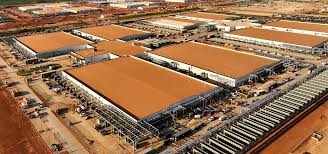Three tech giants identified themselves on Thursday as the developers of a proposed 1-gigawatt-plus AI project on Saline Township farmland, setting up Michigan to receive its first hyperscale data center.
The announcement that OpenAI, Oracle, and Related Digital will construct the enormous computing facility for their joint venture Stargate comes just hours after representatives of DTE Energy, the utility that serves the Saline region, revealed during a quarterly earnings call that the company had signed an agreement to supply 1.4 gigawatts of power to an unidentified data center project.
The Saline Township facility is the project, according to DTE spokesman Ryan Lowry’s confirmation on Thursday afternoon.
The start of construction is scheduled for 2026. It will be worth more than $7 billion, according to the Wall Street Journal.
Gov. Gretchen Whitmer said in a statement, “I’m thankful to these innovative companies for betting on Michigan, building on our work to compete for and win big projects in next-generation industries from cars and clean energy to semiconductors and batteries.”
Whitmer praised the agreement as “the largest economic project in Michigan history,” claiming that it will generate over 450 jobs on-site in addition to additional jobs in Washtenaw County.
General Motors promised 4,000 workers when it proposed a $7 billion investment in two facilities in 2022.
There has been some opposition to the data center proposal.
Related Digital successfully filed a lawsuit accusing the township of exclusionary zoning after the Saline Township board decided last month against rezoning the 575-acre site for the data center.
The public statement on Thursday was made possible by a settlement in that dispute last week and the DTE agreement to supply electricity.
Bridge Michigan sent messages on Thursday, but neither the township’s supervisor nor its lawyer quickly replied.
Ronald Kohler, the Township Planning Commissioner, told Bridge Michigan that although he initially opposed the plan, he has since changed his mind after the developers promised to contribute about $14 million to the neighborhood and make concessions, including groundwater level monitoring on-site wells.
He remarked, “I genuinely believe that once it’s inside, you won’t even know what’s there.”
“You can no longer live in the era of horses and buggies.”
A sales and use tax exemption on equipment, a subsidy authorized by the Legislature in late 2024, will apply to the transaction.
According to the court deal, the corporations will also want a 12-year, 50% local tax abatement.
House Speaker Matt Hall, a Republican from Richland Township, stated on Thursday that he voted against the tax advantages for data centers that have sparked a surge of interest from the tech sector.
He expressed his desire for more early support from economic development officials for initiatives that have the potential to transform communities.
“The public doesn’t want the battery plants when they come in, and we’re starting to see that on the data centers, too,” he stated.
However, according to Phil Santer, chief executive officer of Ann Arbor SPARK economic developers, the deal may indicate more opportunities for Michigan in a time of fast evolving technology.
“We’re thinking about where this can go toward an overall AI strategy for the state,” Santer told Bridge after working on the Saline Township project and touring others across the US.
“Having a data center this size in our backyard just increases our resources.”
The data center facility would take up 250 acres of the property with three buildings totaling 550,000 square feet, according to a news statement from the three businesses.
According to corporate representatives, the campus’s closed-loop server cooling system will reduce water usage “to levels comparable to an office building.”
OpenAI vice president Peter Hoeschele said, “this project will help ensure Michigan is a key part of building the AI infrastructure that will power the next generation of American innovation.”
Additional interest in data centers
The news was made only hours after the two biggest utilities in Michigan announced significant developments in the tech sector’s efforts to construct gigantic data centers in the state, which does not currently have any of the hyperscale facilities owned by corporate behemoths like OpenAI, Google, and Microsoft.
DTE’s power demand will rise by about 25% as a result of supplying electricity to the announced project.
Company representatives intend to meet this significant increase by utilizing additional capacity on DTE’s grid in addition to a $2 billion battery facility funded by the developers.
Joi Harris, President and CEO of DTE, praised the announcement as a chance to provide “substantial affordability benefits for existing customers” and described it as “an exciting milestone” for the business.
During a Thursday earnings call, Harris stated that DTE is in the final stages of talks for an additional 3 gigawatts of data center capacity beyond the Stargate complex.
In the meantime, Consumers Energy officials reported that agreements for three sizable data centers totaling two gigawatts of power are almost complete.
This is roughly twice the demand that Consumers anticipated in the near future when it announced a deal with a single data center developer for up to one gigawatt of power back in August.
Customers have not disclosed information about the companies involved or the locations of those prospective data centers.
However, Microsoft has already declared that it will buy two locations in the Consumers’ region in Allegan and Kent Counties.
From the Howell region to the rural fringes of Ann Arbor, Monroe, and Kalamazoo, more interest in data centers has surfaced.
In the midst of a worldwide data center boom, Michigan lawmakers approved additional tax advantages intended to lure large tech companies to build in Michigan, sparkling a flurry of negotiations.
Supporters hail the multibillion-dollar facilities as a means of increasing Michigan’s tax income and investment.
Local taxes can total millions of dollars annually for each facility, even though the state’s new statute exempts qualified data centers from the state’s 6% sales and use tax.
However, opponents worry that the facilities will put too much strain on Michigan’s energy system, increase utility costs, and have a detrimental impact on rural farming areas that typically attracts data centers due to their wealth of inexpensive, undeveloped land.
Regina Kudla, who lives in the Ypsilanti region where the University of Michigan and Los Alamos National Laboratory are pursuing a $1.2 billion project, said, “How many do we need, and how close together should they be?”
Kudla expressed concern that the facilities’ energy and water consumption would put an excessive strain on available resources.
An agreement that broke after others
Whitmer praised the data center announcement, but the investment follows a number of setbacks to her administration’s economic development plan in recent months.
Among them is Sandisk’s decision to back out of a $63 billion megasite contract near Flint, which would have cost nine times as much as the Saline Township project.
A sizable incentive fund that supported $2 billion in subsidies was also defunded by the Legislature.
In Washtenaw County, the Related Companies are renowned for their innovations and unprecedented contributions to the University of Michigan.
The Related chairman and founder is honored by the name of the Stephen M. Ross School of Business.
Ross not only contributes to sports but also funds the U-M innovation campus that is being built in Detroit.
Another $15 billion Stargate project in Milwaukee, created by Vantage Data Centers, was revealed on Tuesday by privately held OpenAI and Oracle
Utilities get ready
The enormous hyperscale data centers constructed by companies like Google, Microsoft, and Meta typically take up hundreds of acres each and consume as much energy as a medium-sized or even big city.
By distributing the cost of maintaining poles, wires, and power plants among more customers, the new demand may make things more affordable for everyone.
Alternatively, if data center developers are not required to cover the potentially billions of dollars in investments required to connect them to the grid, rates may increase.
Utilities are juggling concerns that the anticipated data center boom would not materialize, leaving ratepayers to foot the tab for that infrastructure build-out, with optimism about the money to be earned by growing their business.
Consumers have proposed creating special regulations in a rate case submitted to state energy regulators.
These regulations would require data center operators to sign 15-year contracts that guarantee consistent electricity use and impose steep exit fees on those who downsize or cease operations mid-contract.
In a regulatory filing, Laura Connolly, Consumers Director of Cost and Pricing, stated that the objective is to prevent large investments intended to support data centers from ultimately increasing prices for regular power consumers.
Beyond financial concerns, environmentalists are concerned that when data centers cause a sharp rise in power use, utilities will stall in their efforts to transition away from fossil fuels.
In fact, DTE and consumers both claim that constructing new fossil fuel power plants is part of their long-term plans to handle data center load.
Garrick Rochow, president and CEO of Consumers Energy, announced on Thursday that the utility will submit a long-term power plan outlining intentions for “both battery capacity and natural gas capacity” to state regulators the following year.
“That will continue to grow as we add more data centers,” Rochow stated.
In the meantime, DTE officials said on Thursday that they aim to build a gas plant in the coming years to offset reduced electricity production from the Monroe coal plant, which is scheduled to shut down in 2032.
However, both utilities argue they can invest in fossil fuels while complying with the state’s climate law, which mandates that they use only clean energy by 2040. Natural gas facilities with carbon capture and storage technology are recognized by the legislation as a legitimate source of clean energy.
Environmental organizations don’t like that approach.
Data centers must purchase clean energy to meet 90% of their demand to be eligible for state tax credits.
However, the Michigan Environmental Council’s chief policy officer, Charlotte Jameson, stated that her organization is advocating for clean power pledges to be explicitly included in the agreements utilities make with data center developers.
“That’s definitely something that we’re going to be pushing back against,” Jameson stated in reference to the plans to construct new gas plants.

















